The positions of the Western Balkan and Eastern-European candidate states on metrics like corruption and democracy show that there is still a long way to go in many regards.
In April, the President of the European Commission Ursula von der Leyen, visiting war-torn Ukraine, offered the country a fast track to EU candidate status. This symbolic gesture puts to doubt the current processes of EU accession and the actual meaning of the status of an EU candidate. Similarly, Moldova and Georgia formally applied for membership both on the 3rd of March 2022, amidst calls for granting candidate status to embolden pro-EU voices in those countries. On the 23rd of June 2022, both Ukraine and Moldova officially gained candidate EU status.
Meanwhile, the Western Balkan region is languishing behind stuck in heterogeneous levels of glacial accession. Currently, the process of becoming an EU member-state does not seem to move forward according to merit and as a consequence, the Union paradoxically hurts its own goals.
The accession process and the Western Balkans
Let’s start with a quick overview of the EU accession process and the current states of the various Western Balkan states. The accession process of the European Union differs from country to country and from region to region. It starts with a ‘European Union Association Agreement’ or ‘Association Agreement’ (AA) for short. There are various forms of AAs, and in the Western Balkans, this takes the shape of the ‘Stabilisation & Association Agreement’ or SAA. All Western Balkan states have signed an SAA starting with North Macedonia in 2004 and ending with Kosovo in 2016. Bosnia & Herzegovina and Kosovo are the only states in the region that have not moved beyond an SAA ‘status’.
Then a country can apply for membership in the EU. Official ‘candidate status’ is granted by the European Council based on a recommendation from the European Commission. Again the European Council votes on the framework for accession talks. The following states currently have ‘candidate status’, year of gaining this status in parentheses: Albania (2014), North Macedonia (2005), Montenegro (2010), Serbia (2012), and Turkey (1999).
Of these Montenegro, Serbia and Turkey have been able to start accession talks. Meaning the opening up of all 35 chapters of EU legislation & standards, which can only be closed when the country has complied with all legislation.
Stalled enlargement
It is no secret that the EU suffers from ‘expansion fatigue’ or even ‘enlargement resistance’, as argued here by Spyros Economides. After the 2004 and 2007 enlargements that saw the Union spread out eastwards, the general attitude towards further enlargement seems frustrated: only Croatia entered in 2013. Some countries, notably Turkey and Serbia, geopolitically align themselves differently and democratic backsliding in both makes sure their accession is a long way off. However, other countries in the Western Balkans are being frustrated not on merit but on rather arbitrary reasons.
North Macedonia is perhaps the most egregious example of EU promises that did not deliver. The country has since its independence behaved pro-Western, signing treaties with NATO and the EU at an early stage, and even implementing its foreign-imposed consociationalist political system under EU pressure. Already in 2005 did North Macedonia gain candidate status. However, because of a Greek veto, it has not been able to move forward since. Finally, in 2018 the Prespa Agreement was signed changing the name of the country. Subsequently, Bulgaria continues to veto the start of accession talks.
Both vetoes do not pertain to the country’s merits in regards to EU accession but are bilateral disputes about identity and historical claims. Subsequently, anti-EU groups in the country are emboldened by the lack of results from the concessions, and even amongst pro-EU groups fatigue with the yet again stalled process of accession is on the rise.

Source: pixabay.com
In neighbouring Albania, frustrations with the accession process are rising: now the coupling of the country with North Macedonia that the Bulgarian veto impacts Tirana as well. No reform the Albanian government can push through will change that. By both the coupling to the Macedonian accession process and the Bulgarian veto the actual merit of the Albanian progress (or lack thereof) is not taken into account.
Side-effects
The EU whose self-professed values & criteria include stability, democracy, equality, and peace; is increasingly fuelling EU scepticism and instability in the Western Balkans region. This is hurting the Union’s values, goals, and credibility. The Macedonian name & history disputes with Bulgaria and Greece have potentially far-reaching consequences in a region brimming with identity and history disputes. The potential for similar conflicts in the future between other prospective members does not bode well for the stability of the Balkans.
Similarly, the punishment for rather arbitrary reasons (Greek & Bulgarian vetoes, Albanian coupling with North Macedonia) hurts the political capital for reform in candidate states. Especially desperately needed reforms attacking corruption, patronage networks, and strengthening the judiciary of candidate states hurt the political elites who gain both influence and money with the current status quo. Why go through sweeping and potentially painful reforms when at a later stage you will get vetoed for reasons out of your own hands?
Why would the populace support a pro-EU leader or party when accession is seemingly impossible?
Failure to integrate the Western Balkans into the EU orbit will leave the region open to Russian and Chinese influence. Certainly, Serbia seems more interested in keeping its Russian ties rather than getting close to the Union, and Montenegro is at a real risk of falling into Chinese debt traps. Regional influence by these geopolitical opponents of the EU could pose a real geopolitical threat right in Europe’s backyard.
These questions are not only important in the Western Balkans but get renewed importance with the recent candidate statues of Ukraine and Moldova. With people asking for bestowing candidate status to embolden pro-reform actors in these countries, an equally vague and long-drawn-out accession process could in the long run hurt reform and pro-EU sentiment.
Especially since some of the basic metrics like democracy and corruption still leave a lot to be desired: the democracy index still classifies Ukraine as a ‘hybrid regime’ and the corruption transparency index places the country in place 122 (between Gabon and Eswatini). How Ukraine and Moldova, both states lacking territorial integrity and one being at open war, would implement the far-reaching informs needed is unclear. In this regard the road ahead seems long and potentially equally frustrating for their respective populations as the Western Balkans experience.
Proposition
Joining the European Union is not some inalienable right of candidate states. Important is that they implement the necessary reforms to be able to conform to EU standards and share EU values. Letting ‘non-ready’ states join the EU for geopolitical reasons seems short-sighted. This is proved for instance by the democratic backsliding of Hungary and Poland; with Budapest now seriously damaging the integrity of the Western response to the war in Ukraine.
The positions of the Western Balkan and Eastern-European candidate states on metrics like corruption and democracy show that there is still a long way to go in many regards.
For these reasons ideas like letting Ukraine join the EEA before full membership or integrating Ukraine in the European Green Deal, which would allow Ukraine to access substantial funds in addition to staving it off hydrocarbons, might be a solution. In the Western Balkans, similar partial integration will preserve the influence of the EU in the region and make it easier to maintain popular public opinion in candidate states without giving up on merit-based accession.
It gives a win politicians can sell internally instead of the empty promise of candidate status.
Non-constructive vetoes on history and identity should have no place in the process, nor has coupling candidate states together as it takes away from the merit-based approach. Internal EU pressure should be put on states vetoing for non-merit-based reasons. Pragmatic solutions like the recent ‘French proposal’ might look attractive but do not solve the underlying issue that EU membership is leveraged for forcing an identity conflict. Already protests against the proposal in North Macedonia have seen inter-ethnic skirmishes and might threaten the consociationalist inter-ethnic equilibrium of the multi-ethnic state.
As events are still unfolding it is not clear what the outcome will be (negotations with the EU have seemingly moved from point zero after the Government adopted the “French proposal”); what is clear however is that either the EU further stakes its position in identity conflicts in the Balkans or the accession in the Western-Balkans will again freeze. Neither is an attractive nor constructive option.
Lastly, allowing candidate countries to open chapters and start negotiations gives lawmakers in those countries more leeway to actually implement much-needed reforms. Failing to implement the necessary reforms will be solely on that country. Politicians will not be able to point to a veto but will have to enact actual change, potentially harmful to their own interests, or be seen as obstructing EU candidacy.
In other words, it brings back the merit-based approach to accession.
Please refer to the Terms before commenting and republishing the content. Note: The views and opinions expressed in this article are those of the author and do not necessarily reflect the views of the Institute of Communication Studies or the donor.

